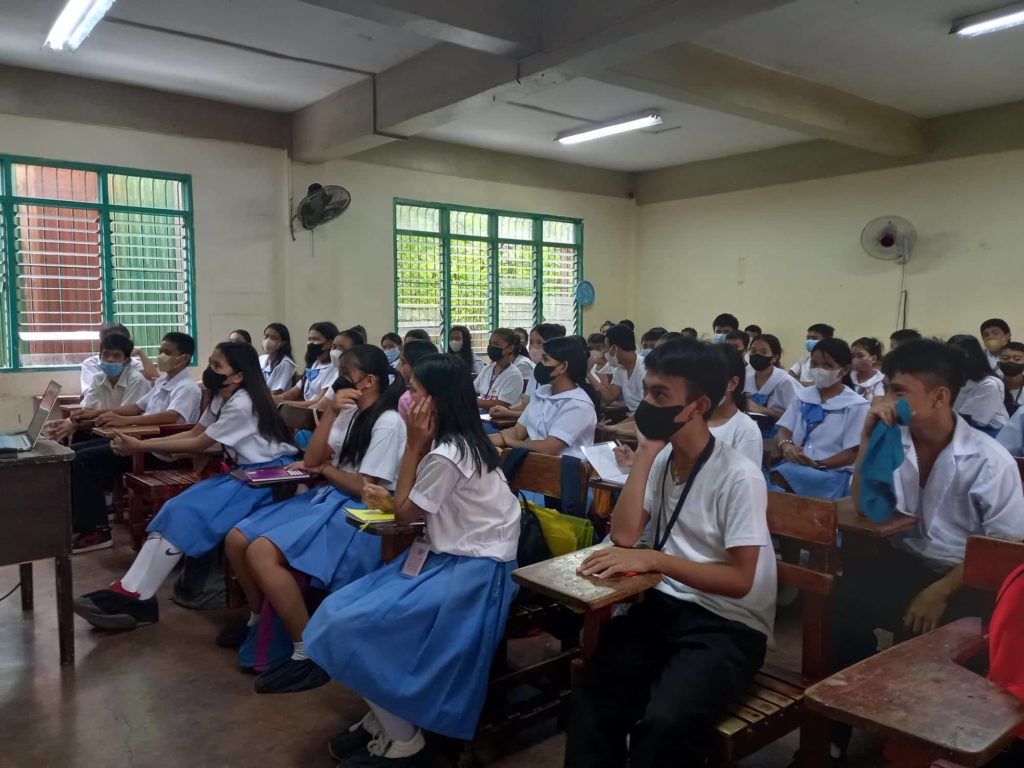Central Visayas among 7 regions first to test revised K-10 program

file photo
MANILA, Philippines — The Department of Education (DepEd) will conduct a pilot test of the revised K-10 curriculum, also known as the Matatag curriculum, in seven regions, including Central Visayas, to identify the challenges and gaps before the scheduled implementation of the new program starting in the school year 2024-2025.
Education Undersecretary Gina Gonong said the pilot implementation would take place in the regions of Ilocos, Cagayan Valley, Central Visayas, Soccsksargen (South Cotabato, Cotabato, Sultan Kudarat, Sarangani and General Santos), the Cordillera Administrative Region, Caraga (Agusan del Norte, Agusan del Sur, Dinagat Islands, Surigao del Norte, and Surigao del Sur), and the National Capital Region.
A DepEd memorandum dated Sept. 8 did not identify the participating schools, saying these would be listed in another memorandum.
READ MORE: DepEd launches new K-10 curriculum, to start in SY 2024-2025
It noted, however, that the school selection underwent a “meticulous approach” to ensure that the pilot program would “reflect the diversity and complexity” of the Philippine education system.
“Schools have been categorized by enrollment size to include small, medium, and large schools. Furthermore, community socioeconomic status has been factored in, categorizing schools into high, medium, and low poverty incidence areas,” Gonong said.
A total of 864 teachers, school heads, and other education officials in the regions and school divisions have been identified to undergo an orientation on the Matatag curriculum, which was officially launched by DepEd on Aug. 10.
To further build the capacity of teachers, DepEd said technical assistance would be provided, as well as regular “collaborative expertise sessions” through learning action cells.
Teaching and learning resources, such as lesson standards and learning activity sheets, would also be provided in the pilot schools.
Assessments
DepEd has allocated P39.2 million for the printing and production of learning resources, based on the memorandum, while P7.94 million would be allotted for the conduct of orientation training for the participants.
Gonong said teachers must regularly conduct formative and summative assessments to monitor whether the students are able to acquire the learning competencies indicated in the recalibrated curriculum.
While the Matatag curriculum undergoes the pilot test, DepEd said research studies would also be conducted with the help of the state-run think tank Philippine Institute of Developmental Studies, the Assessment, Curriculum and Technology Research Center (ACTRC), and the Philippine Normal University-Research Center for Teacher Quality with the SiMERR National Research Centre in Australia.
The ACTRC is a joint research center between the University of Melbourne’s Assessment Research Centre and the University of the Philippines and is supported by the Australian government. It seeks to advise and inform the Philippine education system through curriculum, teaching and assessment research based on empirical studies of curriculum innovation and implementation.
Prior to its phased implementation starting next school year, DepEd decided to do a pilot test this year to identify potential issues in fully carrying out the new curriculum.
After the pilot study, the new curriculum will be implemented in kindergarten and Grades 1, 4, and 7 starting in the school year 2024-2025; followed by Grades 2, 5, and 8 in 2025-2026; Grades 3, 6, and 9 in 2026-2027, and finally Grade 10 in 2027-2028.
Among the salient features of the decongested curriculum are the focus on foundational skills, balanced cognitive demands, reduced learning areas, and “intensified” values education and peace education.
Opposition
During its nationwide launch last month, director Jocelyn Andaya of DepEd’s Bureau of Curriculum Development described the introduction of the new curriculum as a significant milestone in transforming the Philippine basic education system.
Under the Matatag curriculum, lessons for Grade 1 will focus on five subjects: language, reading and literacy, mathematics, makabansa (nationalism), and good manners and right conduct.
This is in contrast to the seven learning areas offered in the current curriculum, namely mother tongue, Filipino, English, Mathematics, Araling Panlipunan, Mapeh, and Edukasyon sa Pagpapakatao.
“We decongested the curriculum by 70 percent, which supports our focus on the essential skills of literacy and numeracy. [This will help reduce] overcrowding and [help focus] on the essential elements of learning,” according to Andaya.
But Raymond Basilio, secretary general of the Alliance of Concerned Teachers, said in a press briefing on Friday: “We are calling on the government to stop the implementation of Matatag. They should call for a genuine democratic consultation and hear the suggestions of parents, students, and teachers.”
Disclaimer: The comments uploaded on this site do not necessarily represent or reflect the views of management and owner of Cebudailynews. We reserve the right to exclude comments that we deem to be inconsistent with our editorial standards.
